| Listing 1 - 10 of 10 |
Sort by
|
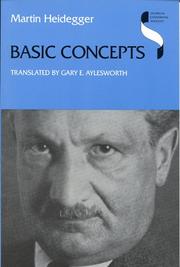
ISBN: 0253327679 Year: 1993 Publisher: Bloomington Indiana university press
Abstract | Keywords | Export | Availability | Bookmark
 Loading...
Loading...Choose an application
- Reference Manager
- EndNote
- RefWorks (Direct export to RefWorks)
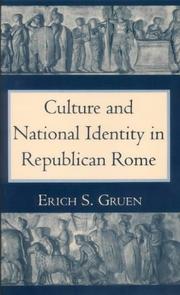
ISBN: 0715624423 9780715624425 Year: 1993 Publisher: London: Duckworth,
Abstract | Keywords | Export | Availability | Bookmark
 Loading...
Loading...Choose an application
- Reference Manager
- EndNote
- RefWorks (Direct export to RefWorks)
Rome --- Civilization. --- Civilization --- Greek influences. --- Civilisation --- Influence grecque --- Greek influences --- Rome - Civilization --- Rome - Civilization - Greek influences
Book
ISBN: 8871231090 Year: 1993 Publisher: Padova : Editoriale Programma,
Abstract | Keywords | Export | Availability | Bookmark
 Loading...
Loading...Choose an application
- Reference Manager
- EndNote
- RefWorks (Direct export to RefWorks)
Magna Graecia (Italy) --- Rome --- Grande-Grèce --- History --- Civilization --- Greek influences --- Histoire --- Civilisation --- Influence grecque
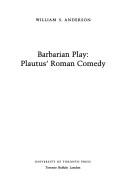
ISBN: 0802028152 Year: 1993 Publisher: Toronto University of Toronto
Abstract | Keywords | Export | Availability | Bookmark
 Loading...
Loading...Choose an application
- Reference Manager
- EndNote
- RefWorks (Direct export to RefWorks)
Latin drama (Comedy) --- Greek influences --- History and criticism --- Plautus, Titus Maccius --- Criticism and interpretation. --- Greece --- Rome --- In literature.

ISBN: 3525252013 9783525252017 Year: 1993 Volume: 101 Publisher: Göttingen: Vandenhoeck und Ruprecht,
Abstract | Keywords | Export | Availability | Bookmark
 Loading...
Loading...Choose an application
- Reference Manager
- EndNote
- RefWorks (Direct export to RefWorks)
French literature --- Littérature française --- Greek influences --- Influence grecque --- Pindar --- Influence --- -French literature --- -History and criticism --- -Pindarus --- Pindare --- Pindaro --- Πίνδαρος --- -Influence --- -Pindar --- Píndaro --- Pindaros --- Littérature française --- History and criticism --- Appreciation --- Influence. --- Pindarus --- French poetry --- 16th century --- Greek influences. --- French literature - 16th century - History and criticism --- French literature - Greek influences --- Pindar - Appreciation - France --- Pindar - Influence
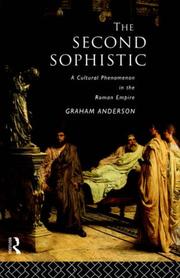
ISBN: 0415099889 9780415099882 Year: 1993 Publisher: London: Routledge,
Abstract | Keywords | Export | Availability | Bookmark
 Loading...
Loading...Choose an application
- Reference Manager
- EndNote
- RefWorks (Direct export to RefWorks)
Roman history --- History of civilization --- History of philosophy --- Rome --- Greece --- Ancient rhetoric --- Antieke retoriek --- Retoriek [Antieke ] --- Retoriek van de Oudheid --- Rhetoric [Ancient ] --- Rhétorique ancienne --- Rhétorique de l'Antiquité --- Sofisten (Griekse filosofie) --- Sophistes (Philosophie grecque) --- Sophists (Greek philosophy) --- Rhetoric, Ancient --- Sophistes grecs --- Civilization --- Greek influences --- History --- Civilisation --- Influence grecque --- Histoire --- Philosophie grecque --- --Sophiste --- --Histoire romaine --- --30 av JC-284, --- Rome ancienne --- --Sophists (Greek philosophy) --- Second Sophistic movement --- Classical languages --- Greek language --- Greek rhetoric --- Latin language --- Latin rhetoric --- Philosophy, Ancient --- Rhetoric --- -Civilization --- -Greek influences. --- Rhetoric, Ancient. --- Second Sophistic movement. --- Rome (Italy) --- Greek influences. --- Sophists (Greek philosophy). --- Rhétorique ancienne --- Rim --- Roman Empire --- Roman Republic (510-30 B.C.) --- Romi (Empire) --- Second Sophistic school --- Empire, 30 B.C.-284 A.D. --- Sophiste --- Histoire romaine --- Rome - History - Empire, 30 BC-284 AD --- Rome - Civilization - Greek influences

ISBN: 3515063412 9783515063418 Year: 1993 Volume: 64 Publisher: Stuttgart: Steiner,
Abstract | Keywords | Export | Availability | Bookmark
 Loading...
Loading...Choose an application
- Reference Manager
- EndNote
- RefWorks (Direct export to RefWorks)
Greek poetry, Hellenistic --- History and criticism. --- Greek influences. --- Homer --- Criticism, Textual. --- Influence. --- -Greek poetry, Hellenistic --- -Hellenistic Greek poetry --- Greek literature, Hellenistic --- History and criticism --- Greek influences --- -Homer --- -Criticism, Textual --- Influence --- -History and criticism --- -Hóiméar --- Hūmīrūs --- Homeros --- Homerus --- Gomer --- Omir --- Omer --- Omero --- Ho-ma --- Homa --- Homérosz --- האמער --- הומירוס --- הומר --- הומרוס --- هومر --- هوميروس --- 荷马 --- Ὅμηρος --- Гамэр --- Hamėr --- Омир --- Homero --- 호메로스 --- Homerosŭ --- Homērs --- Homeras --- Хомер --- ホメーロス --- ホメロス --- Гомер --- Homeri --- Hema --- Pseudo-Homer --- Pseudo Omero --- Criticism, Textual --- Homère --- Hellenistic Greek poetry --- Hóiméar --- Greek poetry, Hellenistic - History and criticism. --- Greek poetry, Hellenistic - Greek influences. --- Poésie alexandrinePoésie alexandrine --- Homère Poésie --- Poésie grecque hellénistique --- Sources --- Poésie alexandrinePoésie alexandrine --- Homère Poésie --- Poésie grecque hellénistique
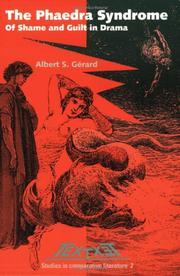
ISBN: 9051834896 9789051834895 9789004648180 Year: 1993 Publisher: Leiden ;Boston Brill
Abstract | Keywords | Export | Availability | Bookmark
 Loading...
Loading...Choose an application
- Reference Manager
- EndNote
- RefWorks (Direct export to RefWorks)
Originating probably in some oral cautionary tale, the Phaedra story illustrates a peculiar pattern of transgression and retribution. This Phaedra syndrome provided inspiration for many major writers from Euripides to Gabriele d'Annunzio. The present book offers a close re-reading and a re-assessment of four acknowledged masterpieces - Euripides' Hippolutos, Seneca's Phaedra, Lope de Vega's Castigo sin venganza and Racine's Phèdre: together with Lope's Italian source. Matteo Bandello's Novella 44, they all deal with the old tale or none of its analogues. While paying minute comparative attention to the texts, it aims at clarifying the relevance of each work for the meandrous evolution of religious beliefs and ethical criteria in the history of European society, ranging from Democritus' effort to react against his contemporaries' archaic shame-culture attitudes to Latin Stoicism, to the syncretic Baroque outlook in siglo de oro drama and to the radical puritanical inwardness of French Jansenism. The last two chapters offer an original interpretation of Phèdre as the supreme poetic utterance of Racine's confusion and perplexity in front of the unresolved contradictions in his faith; a case is made in the Conclusion the view that the puzzled and puzzling mood of this mysterious play exemplifies the new mind-set that was paving the way for Enlightenment rationalism and the ensuing dechristianisation of the Western intelligentsia... Back Cover.
Comparative literature --- Thematology --- Phaedra (Greek mythology) in literature. --- European drama (Tragedy) --- Guilt in literature. --- Shame in literature. --- Phèdre (Mythologie grecque) dans la littérature --- Tragédie européenne --- Littérature comparée --- Culpabilité dans la littérature --- Honte dans la littérature --- Greek influences. --- Themes, motives --- Influence grecque --- Thèmes, motifs --- Phèdre (Mythologie grecque) dans la littérature --- Tragédie européenne --- Littérature comparée --- Culpabilité dans la littérature --- Honte dans la littérature --- Thèmes, motifs --- Phaedra --- Themes, motives.
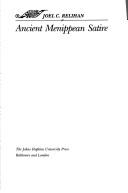
ISBN: 0801845246 Year: 1993 Publisher: Baltimore, MD : Johns Hopkins University Press,
Abstract | Keywords | Export | Availability | Bookmark
 Loading...
Loading...Choose an application
- Reference Manager
- EndNote
- RefWorks (Direct export to RefWorks)
Classical literature --- -Satire, Greek --- -Satire, Latin --- -Satire --- -Rhetoric, Ancient --- Parody --- Literary form --- -Form, Literary --- Forms, Literary --- Forms of literature --- Genre (Literature) --- Genre, Literary --- Genres, Literary --- Genres of literature --- Literary forms --- Literary genetics --- Literary genres --- Literary types (Genres) --- Literature --- Comic literature --- Literature, Comic --- Travesty --- Satire --- Burlesque (Literature) --- Caricature --- Classical languages --- Greek language --- Greek rhetoric --- Latin language --- Latin rhetoric --- Wit and humor --- Invective --- Latin satire --- Latin wit and humor --- Greek satire --- Greek wit and humor --- Literature, Classical --- Literature, Ancient --- Greek literature --- Latin literature --- History and criticism --- Greek influences --- Classical influences --- History --- -Rhetoric --- Rhetoric --- -History and criticism --- -Classical literature --- -Comic literature --- Form, Literary --- Ancient rhetoric --- Rhetoric, Ancient --- Satire, Greek --- Satire, Latin --- Rhetoric, Ancient.
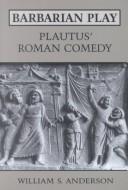
ISBN: 1281997560 9786611997564 1442671173 9781442671171 9780802079411 0802079415 1442654295 Year: 1993 Publisher: Toronto, [Ontario] ; Buffalo, [New York] ; London, [England] : University of Toronto Press,
Abstract | Keywords | Export | Availability | Bookmark
 Loading...
Loading...Choose an application
- Reference Manager
- EndNote
- RefWorks (Direct export to RefWorks)
Anderson explores the special form of metatheatre that we admire in Plautus, by which he undermines the assumptions of his Greek `models' and replaces them with a new, confident Roman comedy.
Latin drama (Comedy) --- LITERARY CRITICISM / Ancient & Classical. --- Latin drama --- Greek influences. --- History and criticism. --- Plautus, Titus Maccius --- Plaute --- Plauto, Tito Maccio --- Criticism and interpretation. --- Plavt, Tit Makt︠s︡iĭ --- Plautus, M. Accius --- Plautus --- Plautus, M. Attius --- Plautus, Marcus Actius --- Plautus, Marcus Accius --- Plautus, Marcus Attius --- Plauto, Marco Accio --- Plautos, Titos Makkios --- פלאוטוס --- Rome (Empire) --- Greece. --- Rome --- Greece --- In literature. --- al-Yūnān --- Ancient Greece --- Ellada --- Ellas --- Ellēnikē Dēmokratia --- Elliniki Dimokratia --- Grčija --- Grèce --- Grecia --- Gret͡sii͡ --- Griechenland --- Hellada --- Hellas --- Hellenic Republic --- Hellēnikē Dēmokratia --- Kingdom of Greece --- République hellénique --- Royaume de Grèce --- Vasileion tēs Hellados --- Xila --- Yaṿan --- Yūnān --- Rim --- Roman Empire --- Roman Republic --- Romi (Empire) --- Byzantine Empire --- Italy
| Listing 1 - 10 of 10 |
Sort by
|

 Search
Search Feedback
Feedback About UniCat
About UniCat  Help
Help News
News